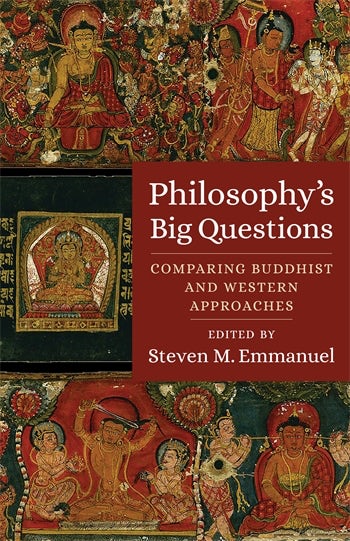Share this Story
Philosophy's Big Questions
Professor Steven Emmanuel’s latest book provides insights for a good and happy life
University News | August 27, 2021
 Virginia Wesleyan University Professor of Philosophy and Dean of the Susan S. Goode School of Arts and Humanities Steven Emmanuel’s new book is hot off the press. Published in July 2021, Emmanuel is the editor of “Philosophy's Big Questions: Comparing Buddhist and Western Approaches.”
Virginia Wesleyan University Professor of Philosophy and Dean of the Susan S. Goode School of Arts and Humanities Steven Emmanuel’s new book is hot off the press. Published in July 2021, Emmanuel is the editor of “Philosophy's Big Questions: Comparing Buddhist and Western Approaches.”
According to the book’s publisher Columbia University Press, “Philosophy’s Big Questions” features striking and generative comparisons of Buddhist and Western thought, and challenges our thinking in fundamental ways, offering readers new conceptual tools, methods, and insights for the pursuit of a good and happy life.
The newly released work is divided into eight chapters written by Emmanuel and seven other scholars. The topics include: How Should We Live? What is Knowledge? Does Reality Have a Ground? Can Consciousness Be Explained? Is Anything We Do Really Up to Us? Why Do Bad Things Happen to Good People? How Much is Enough? What Do We Owe Future Generations?
“The essays in this book look to the seminal figures and texts of the Buddhist tradition for fresh insight into some of philosophy’s big questions about happiness and the good life,” says Emmanuel, “as well as the nature and scope of human knowledge, the ultimate structure of reality, the nature of consciousness, the relation between causality and free will, the pervasiveness of human suffering, and the conditions for a just and flourishing society.”
Emmanuel says that the contributors to the book are all trained in the Western tradition, but have a deep grounding in Buddhist philosophical literature.
“Although the approach they take is comparative, it is not merely descriptive. Each discussion is set up in a way that creates a genuine cross-cultural dialogue by engaging Buddhist thinkers on their own terms.”
He stresses that it is important to note that these questions are intended to indicate the general topic or philosophical territory under discussion. This allows the contributors the freedom to show where and how the philosophical interests of Buddhist and Western thinkers intersect and inform each other, while paying close attention to the distinctive ways in which they frame and answer the big questions.
 "Philosophy's Big Questions" builds on Emmanuel's earlier works. He is also the editor of Buddhist Philosophy: A Comparative Approach (2018) and A Companion to Buddhist Philosophy (2013), as well as many publications on major figures in the modern European tradition.
"Philosophy's Big Questions" builds on Emmanuel's earlier works. He is also the editor of Buddhist Philosophy: A Comparative Approach (2018) and A Companion to Buddhist Philosophy (2013), as well as many publications on major figures in the modern European tradition.
“My hope is that this latest volume will not only encourage readers to learn more about the Buddhist philosophical tradition, but that it will convince them of the value of diversifying the philosophy curriculum. After all, if we are truly interested in making progress toward answering the big questions, then we should be open to exploring new and different ways of investigating them. We need all the insight we can get. Allowing diverse voices and cultural perspectives to enter the conversation enriches our philosophical imagination and expands the possibilities for thought. Indeed, as the essays in this volume clearly demonstrate, a rigorous and respectful engagement with thinkers in other traditions can produce the very kinds of insights that we need in order to advance our understanding of the world and our place in it.”
As a result of his recent work, Emmanuel was invited to lecture for the Smithsonian Institute Associate’s Program. His latest talk was titled, “How Much is Enough: Buddhist and Western Perspectives on Greed, Prosperity, and Happiness.” His next lecture, scheduled for November 2021, will be “For the Love of Wisdom: The Value of Philosophy for Everyday Life.”
Read more about Philosophy’s Big Questions and Dr. Emmanuel’s interview on Blog of the American Philosophical Association (APA).

